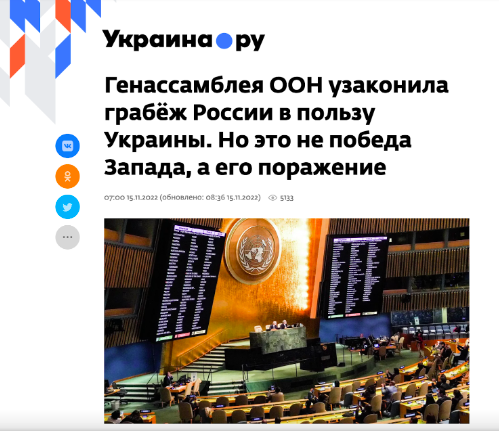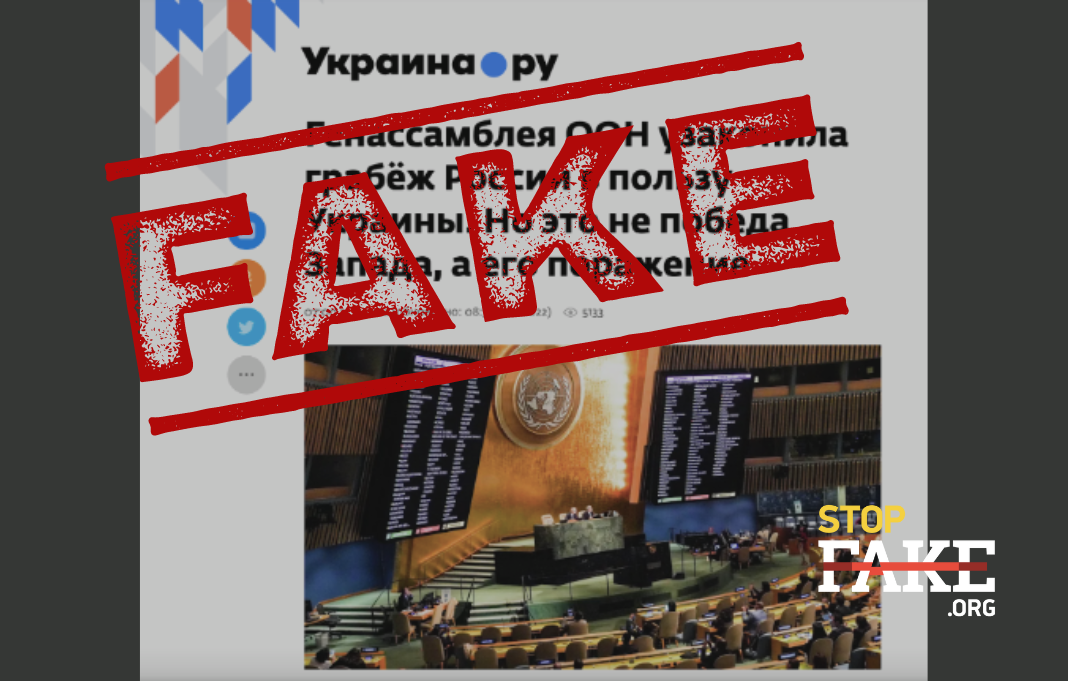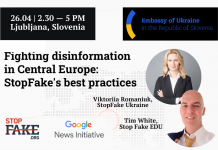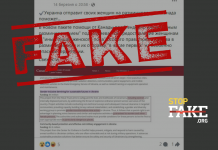The UN General Assembly resolution cannot oblige Russia to pay reparations to Ukraine. The main idea of the document is not to immediately confiscate frozen Russian assets, but to create an international registry to document the damage caused to Ukraine by Russian aggression.
On November 14, the UN General Assembly adopted a resolution supporting the idea of creating a registry to document the damage caused to Ukraine by the Russian war. Predictably, the Russian media reacted to the UN General Assembly’s decision with a storm of criticism and disinformation. In particular, the pro-Kremlin media stated that the UN is looking for ways to rob Russia. It is also claimed that the decision is “legally null and void” and “illegal,” while the EU and the US are engaged in “economic terrorism – illegal blockades, illegal sanctions, and attempts to economically strangle entire countries and peoples.”
Russian information that the UN allegedly supported robbing Russia and that the General Assembly resolution itself was “legally null and void” is disinformation.

General Assembly resolutions are indeed recommendatory in nature for implementation. Such a document cannot oblige Russia to pay reparations to Ukraine for illegally invading Ukrainian territory. However, the main idea of the UN resolution is not to immediately confiscate frozen Russian assets, but to create an international registry to document the damage caused to Ukraine by Russian aggression.
At this stage, no one is discussing seizing Russian assets in favor of Ukraine, and the resolution itself is only the first step in this direction. That is why all of Russia’s claims about the so-called “illegality of the UN General Assembly’s decision to confiscate Russian assets” have no factual basis whatsoever.
According to the resolution, the UN General Assembly recognized the expediency of reparations to Ukraine from Russia for the damage caused by the war. For this purpose, UN member states, in cooperation with Ukraine, are recommended to create an international registry to record all the destruction. In fact, the resolution proposes to create an international infrastructure to deal with the consequences of the Russian war in Ukraine.
“Recognizes that the Russian Federation must be held to account for any violations of international law in or against Ukraine,Recognizes also the need for the establishment, in cooperation with … Ukraine, of an international mechanism for reparation for damage… Recommends the creation by Member States, in cooperation with Ukraine, of an international register of damage to serve as a record, in documentary form, of evidence and claims information on damage, loss or injury to all natural and legal persons concerned, as well as the State of Ukraine, caused by internationally wrongful acts of the Russian Federation in or against Ukraine, as well as to promote and coordinate evidence-gathering,” stated in the text of the resolution.
Ukrainian President Volodymyr Zelenskyy called the adopted resolution a political basis for future decisions on the transfer of Russian assets, which are now frozen in different countries worldwide, to Ukraine. According to Zelenskyy, on the basis of this resolution, state leaders will be able to make relevant decisions and explain them to their societies and businesses.
Commenting on Russia’s claims about “a Western conspiracy to steal Russian assets,” Canadian UN representative Robert Rae called them unfounded. Robert Ray stressed that there is not a single word in the resolution about immediately confiscating assets in favor of Ukraine, and the Russian delegation’s indignation once again shows that the aggressor state refuses to take responsibility for the war unleashed against a sovereign country.
“The resolution only says that there has to be a registry in order for there to be an eventual reckoning for the damage and destruction that has been caused. And now all we are saying is, please, recommend and allow Ukraine to create a registry that other countries can join. This is not about seizing assets or dealing with state’s sovereignty,” stressed the Canadian representative to the UN.
Russian statements about the alleged “illegality” of Western sanctions are a recurring Russian narrative that has been used by the pro-Kremlin media since 2014. Large-scale sanctions against the Russian economy, top officials, and pro-Kremlin oligarchs are not “Western aggression” against Russia, but the U.S. and EU response to Russia’s deadly full-scale war against Ukraine. In 2014, in response to the Kremlin’s invasive politics, Ukraine’s Western partners began to impose the first packages of restrictions against the Russian economy. The first wave of European Union and United States sanctions against Russia was imposed immediately after Russia began occupying Ukraine’s Crimea, in March 2014. Ukraine’s Western partners imposed restrictions for unleashing war and seizing parts of Donetsk and Luhansk regions as early as July 2014. New even tougher packages of restrictions began to be introduced after the Russian full-scale invasion of Ukraine in the early hours of February 24, 2022. Since then, the sanctions lists have been constantly expanding.





